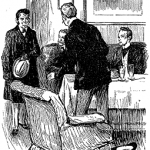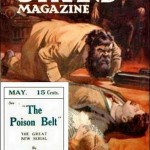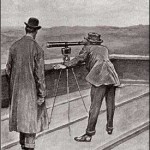“A hunthred in gold and the rest in notes,” said the major, with a sigh of relief.
The cashier counted and handed over a thick packet of crisp rustling paper and a little pile of shining sovereigns. The major stowed away the first in the pocket-book and the latter in his trouser pockets. Then he swaggered out with a great increase of pomposity and importance, and ordered his cabman to drive to Kennedy Place.
Von Baumser was sitting in the major’s campaigning chair, smoking his china-bowled pipe and gazing dreamily at the long blue wreaths. Times had been bad with the comrades of late, as the German’s seedy appearance sufficiently testified. His friends in Germany had ceased to forward his small remittance, and Endermann’s office, in which he had been employed, had given him notice that for a time they could dispense with his services. He had been spending the whole afternoon in perusing the long list of “wanteds” in the Daily Telegraph, and his ink-stained forefinger showed the perseverance with which he had been answering every advertisement that could possibly apply to him. A pile of addressed envelopes lay upon the table, and it was only the uncertainty of his finances and the fact that the humble penny stamp mounts into shillings when frequently employed, that prevented him from increasing the number of his applications. He looked up and uttered a word of guttural greeting as his companion came striding in.
“Get out of this,” the major said abruptly. “Get away into the bedroom.”
“Potztausand! Vot is it then?” cried the astonished Teuton.
“Out with you! I want this room to meself.”
Von Baumser shrugged his shoulders and lumbered off like a good-natured plantigrade, closing the door behind him.
When his companion had disappeared the major proceeded to lay out all his notes upon the table, overlapping each other, but still so arranged that every separate one was visible. He then built in the centre ten little golden columns in a circle, each consisting of ten sovereigns, until the whole presented the appearance of a metallic Stonehenge upon a plain of bank notes. This done, he cocked his head on one side, like a fat and very ruddy turkey, and contemplated his little arrangement with much pride and satisfaction.
Solitary delight soon becomes wearisome, however, so the veteran summoned his companion. The Teuton was so dumbfounded by this display of wealth, that he was bereft for a time of all faculty of speech, and could only stare open-mouthed at the table. At last he extended a fore-finger and thumb and rubbed a five pound note between them, as though to convince himself of its reality, after which he began to gyrate round the table in a sort of war dance, never taking his eyes from the heap of influence in front of him. “Mein Gott!” he exclaimed, “Gnadiger Vater! Ach Himmel! Was fur eine Schatze! Donnerwetter!” und a thousand other cacophonous expressions of satisfaction and amazement.
When the old soldier had sufficiently enjoyed the lively emotion which showed itself on every feature of the German’s countenance, he picked up the notes and locked them in his desk together with half the gold. The other fifty pounds he returned into his pocket.
“Come on!” he said to his companion abruptly.
“Come vere? Vat is it?”
“Come on!” roared the major irascibly. “What d’ye want to stand asking questions for? Put on your hat and come.”
The major had retained the cab at the door, and the two jumped into it.
“Drive to Verdi’s Restaurant,” he said to the driver.
When they arrived at that aristocratic and expensive establishment, the soldier ordered the best dinner for two that money could procure. “Have it riddy in two hours sharp,” he said to the manager. “None of your half-and-half wines, mind! We want the rale thing, and, be ged! we can tell the difference!”
Having left the manager much impressed, the two friends set out for a ready-made clothing establishment. “I won’t come in,” the major said, slipping ten sovereigns into Von Baumser’s hand. “Just you go in and till them ye want the best suit o’ clothes they can give you. They’ve a good seliction there, I know.”
“Gott in Himmel!” cried the amazed German. “But, my dear vriend, you cannot vait in the street. Come in mit me.”
“No, I’ll wait,” the old soldier answered. “They might think I was paying for the clothes if I came in.”
“Well, but so you—”
“Eh, would ye?” roared the major, raising his cane, and Von Baumser disappeared precipitately into the shop.
When he emerged once more at the end of twenty minutes, he was attired in an elegant and close-fitting suit of heather tweed. The pair then made successive visits to a shoe-maker, a hatter, and a draper, with the result that Von Baumser developed patent leather boots, a jaunty brown hat, and a pair of light yellow gloves. By the end of their walk there seemed nothing left of the original Von Baumser except a tawny beard, and an expression of hopeless and overpowering astonishment.
Having effected this transformation, the friends retraced their steps to Verdi’s and did full justice to the spread awaiting them, after which the old soldier won the heart of the establishment by bestowing largess upon every one who came in his way. As to the further adventures of these two Bohemians, it would be as well perhaps to draw a veil over them. Suffice it that, about two in the morning, the worthy Mrs. Robins was awakened by a stentorian voice in the street below demanding to know “Was ist das Deutsche Vaterland?”—a somewhat vexed question which the owner of the said voice was propounding to the solitary lamp-post of Kennedy Place. On descending the landlady discovered that the author of this disturbance was a fashionably dressed gentleman, who, upon closer inspection, proved to her great surprise to be none other than the usually demure part proprietor of her fourth floor. As to the major, he walked in quietly the next day about twelve o’clock, looking as trim and neat as ever, but minus the balance of the fifty pounds, nor did he think fit ever to make any allusion to this some what heavy deficit.





